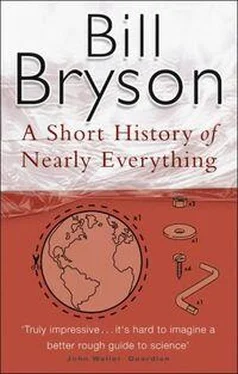“could make himself invisible.” Ball, p. 125.
“An ounce of phosphorus retailed for six guineas” Durant and Durant, p. 516.
“and got credit for none of them.” Strathern, p. 193.
“which is why we ended up with two branches of chemistry . . .” Davies, p. 14.
“perhaps $20 million in today’s money.” White, Rivals , p. 63.
“the fourteen-year-old daughter of one of his bosses.” Brock, p. 92.
“ jour de bonheur . . . ” Gould, Bully for Brontosaurus , p. 366.
“Lavoisier made some dismissive remarks . . .” Brock, pp. 95-96.
“failed to uncover a single one.” Strathern, p. 239.
“taken away and melted down for scrap.” Brock, p. 124.
“a highly pleasurable thrilling . . .” Cropper, p. 139.
“Theaters put on ‘laughing gas evenings’ . . .” Hamblyn, p. 76.
“(What Brown noticed . . . )” Silver, p. 201.
“for lukewarmness in the cause of liberty . . .” Dictionary of National Biography , vol. 19, p. 686.
“a diameter of 0.00000008 centimeters . . .” Asimov, The History of Physics , p. 501.
“Even water was variously rendered . . .” Boorse et al., p. 75.
“Later, for no special reason . . .” Ball, p. 139.
“Luck was not always with the Mendeleyevs.” Brock, p. 312.
“a competent but not terribly outstanding chemist . . .” Brock, p. 111.
“this was an idea whose time had not quite yet come . . .” Carey, p. 155.
“chemistry really is just a matter of counting.” Ball, p. 139.
“the most elegant organizational chart ever devised . . .” Krebs, p. 23.
“120 or so . . .” From a review in Nature , “Mind over Matter?” by Gautum R. Desiraju, September 26, 2002.
“purely speculative . . .” Heiserman, p. 33.
“Marie Curie dubbed the effect ‘radioactivity.’ ” Bodanis, E = mc 2 , p. 75.
“He never accepted the revised figures . . .” Lewis, The Dating Game , p. 55.
“it is an unstable element.” Strathern, p. 294.
“featured with pride the therapeutic effects . . .” Advertisement in Time magazine, January 3, 1927, p. 24.
“Radioactivity wasn’t banned in consumer products until 1938.” Biddle, p. 133.
“Her lab books are kept in lead-lined boxes . . .” Science , “We Are Made of Starstuff,” May 4, 2001, p. 863.
CHAPTER 8 EINSTEIN’S UNIVERSE
“an average of slightly over one student a semester . . .” Cropper, p. 106.
“the thermodynamic principles of, well, nearly everything . . .” Cropper, p. 109.
“thermodynamics didn’t apply simply to heat and energy . . .” Snow, The Physicists , p. 7.
“the Principia of thermodynamics . . .” Kevles, The Physicists , p. 33.
“he came to the United States with his family . . .” Kevles, pp. 27-28.
“The speed of light turned out to be the same . . .” Thorne, p. 65.
“probably the most famous negative result in the history of physics.” Cropper, p. 208.
“the work of science was nearly at an end . . .” Nature , “Physics from the Inside,” July 12, 2001, p. 121.
“were among the greatest in the history of physics . . .” Snow, The Physicists , p. 101.
“His very first paper . . .” Bodanis, E = mc 2, p. 6.
“J. Willard Gibbs in Connecticut had done that work as well . . .” Boorse et al., The Atomic Scientists , p. 142.
“one of the most extraordinary scientific papers ever published . . .” Ferris, Coming of Age in the Milky Way , p. 193.
“had reached the conclusions by pure thought, unaided . . .” Snow, The Physicists , p. 101.
“no less than 7 x 10 18joules of potential energy . . .” Thorne, p. 172.
“Even a uranium bomb . . .” Bodanis, E = mc 2 , p. 77.
“Oh, that’s not necessary . . .” Nature , “In the Eye of the Beholder,” March 21, 2002, p. 264.
“the highest intellectual achievement of humanity . . .” Boorse et al., p. 53.
“he was simply sitting in a chair . . .” Bodanis, E = mc 2 , p. 204.
“‘Cosmological Considerations on the General Theory of Relativity.’ ” Guth, p. 36.
“‘Without it,’ wrote Snow in 1979 . . .” Snow, The Physicists , p. 21.
“Crouch was hopelessly out of his depth . . .” Bodanis, E = mc 2 , p. 215.
“I am trying to think who the third person is.” Quoted in Hawking, A Brief History of Time, p. 91; and Aczel, God’s Equation , p. 146.
“the faster one moves the more pronounced these effects become.” Guth, p. 37.
“a baseball thrown at a hundred miles an hour . . .” Brockman and Matson, How Things Are , p. 263.
“we all commonly encounter other kinds of relativity . . .” Bodanis, E = mc 2 , p. 83.
“the ultimate sagging mattress . . .” Overbye, p. 55.
“In some sense, gravity does not exist . . .” Kaku, “The Theory of the Universe?” in Shore, Mysteries of Life and the Universe , p. 161.
“Edwin enjoyed a wealth of physical endowments, too.” Cropper, p. 423.
“At a single high school track meet . . .” Christianson, Edwin Hubble , p. 33.
“One Harvard computer, Annie Jump Cannon . . .” Ferris, Coming of Age in the Milky Way , p. 258.
“elderly stars that have moved past their ‘main sequence phase’ . . .” Ferguson, Measuring the Universe , pp. 166-67.
“They could be used as ‘standard candles’ . . .” Ferguson, p. 166.
“was developing his seminal theory . . .” Moore, Fireside Astronomy , p. 63.
“In 1923 he showed that a puff of distant gossamer . . .” Overbye, p. 45; and Natural History , “Delusions of Centrality,” December 2002-January 2003, pp. 28-32.
“no one had hit on the idea of the expanding universe before.” Hawking, The Universe in a Nutshell , pp. 71-72.
“In 1936 Hubble produced a popular book . . .” Overbye, p. 14.
“the whereabouts of the century’s greatest astronomer . . .” Overbye, p. 28.
CHAPTER 9 THE MIGHTY ATOM
“All things are made of atoms.” Feynman, p. 4.
“forty-five billion billion molecules.” Gribbin, Almost Everyone’s Guide to Science , p. 250.
“up to a billion for each of us” Davies, p. 127.
“Atoms, however, go on practically forever.” Rees, p. 96.
“a paramecium swimming in a drop of water . . .” Feynman, pp. 4-5.
“We might as well attempt to introduce . . .” Boorstin, The Discoverers , p. 679.
“In 1826, the French chemist P. J. Pelletier . . .” Gjertsen, p. 260.
“a confused Pelletier, upon beholding the great man . . .” Holmyard, Makers of Chemistry , p. 222.
“forty thousand people viewed the coffin . . .” Dictionary of National Biography , vol. 5, p. 433.
“For a century after Dalton made his proposal . . .” Von Baeyer, Taming the Atom , p. 17.
Читать дальше












